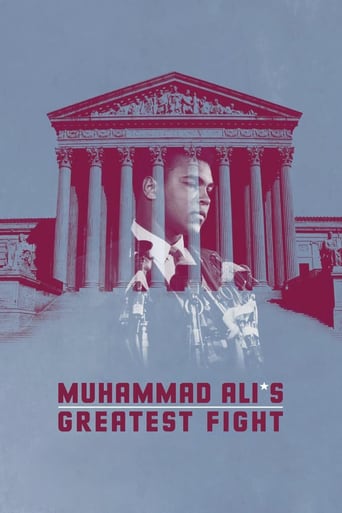shawnwells
What I enjoyed most about this movie, it wasn't dramatic. It wasn't polished. It was real. It was factual. It shows us that life isn't full of glitz. It shows us that real life the hours and days are long. The conflict is real. I loved that all of Ali's footage was actual footage. It was well done. I enjoyed the different layers of story lines. You had the SCJ, the interns, the Justices with their staffs, you had the support staff and the families. It was welcomed to see the "behind the scenes" office interactions along with the times at their houses. I appreciated the personal touch they showed in dealing with a mental illness and how that wore on the Justice, along with his own physical battle. I came across it yesterday on HBO and was instantly drawn in. It was like a great book. I sat down and couldn't stop watching until it was over. We need more movies like this one.
PKazee
The filmmaking (or rather, videomaking) by Stephen Frears is not particularly noteworthy, nor are some of the secondary performances. Still, the film allows one a rather fascinating peek at various forces (personal and cultural) influencing the Supreme Courts decision with regard to the legality of Mohammed Ali's refusal to serve in the U.S. army. As noted elsewhere, the segments involving the competition between interns are very much a distraction. Only one of the interns is of any narrative importance and his thread could easily have been played out in scenes between him and Judge Harlan (Christopher Plummer). In short, view this for the history, rather than the art.
Cameron McLeod
While being an interesting look at a major event in American history, I thought the general mood of the film didn't really mesh with the subject matter.The locker room bro moments of the clerks felt more like a distraction in my mind from what was really interesting. I understand that throughout the move there's an attempt to compare and contrast the generational differences between the justices and clerks, but really it came out more muddled than insightful. But hey, maybe that's just me.I think a more interesting movie would have been a more focused study into the closed-off perspective of the justice's world. A closed-room style would have fitted well. The hippies lined up outside made to seem distant and strange, even to the blue justices.The movie also seemed a little closed off and lacking much room for audience pondering. Mohammed Ali was valid for conscientious objector status. No question. This might have been the case, but I'd rather come to that conclusion myself.Anyway, it was a fine TV movie. Definitely worth a watch.
RealDuality
I had a mixed-reaction to this film. It panders to the audience too much, with the workers in the Supreme Court conversing on subjects that would be obvious to them. Also, at some moments it feels like the plot is jumping from one moment to the next, rather than moving along seamlessly. My third criticism is that it glosses over the likely fact that Ali didn't want to go to the Vietnam War because he didn't want to fight. The movie gives the inaccurate impression that the boxer stood purely on religious grounds. However, that is not what the film is about. It was assumed by the Solicitor General that Ali was honest with his convictions, and this work concerns a fight in the highest court.The main reason to see the HBO movie is Christopher Plummer's fantastic performance as Justice John Marshall Harlan. He plays a reflective man nearing the end of his life beautifully. Christopher and Frank Langella, who plays Chief Justice Warren Burger, have some great scenes together. Additionally, there is some well-chosen historical footage of Ali speaking to the media. If you're a fan of politics or just want to see Plummer knock one out of the park, you will probably enjoy Muhammad Ali's Greatest Fight; but, I think it is overly simplistic.




